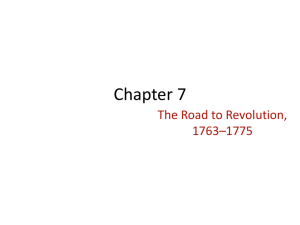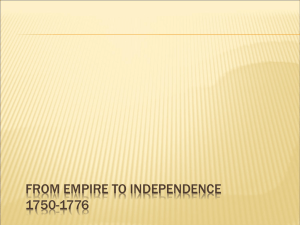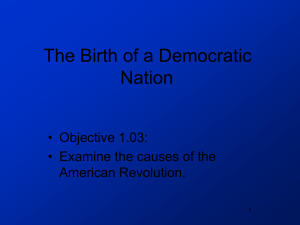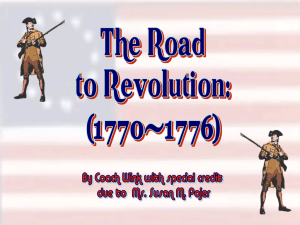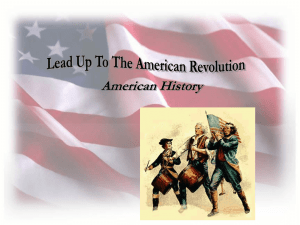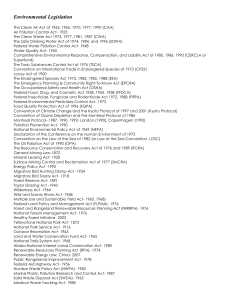Colonization and the Revolution - Van Independent School District
advertisement
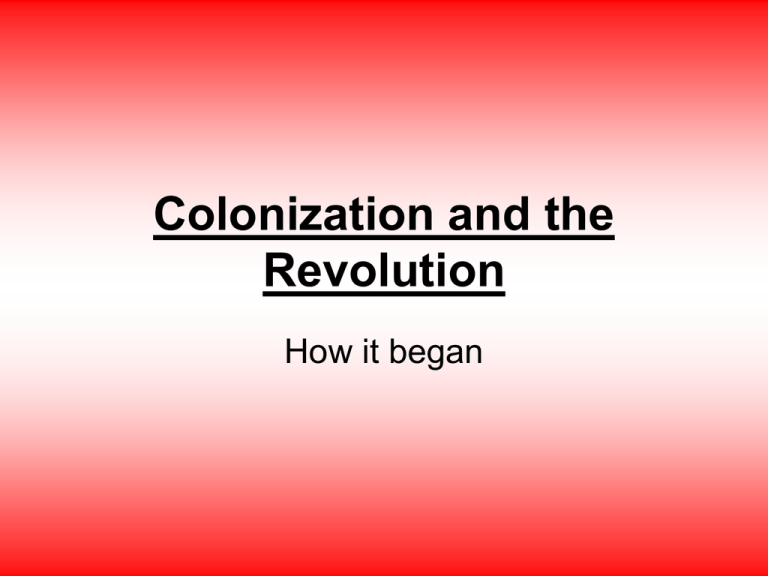
Colonization and the Revolution How it began Important Places • Roanoke- First attempt at settling the new world in 1587. All settlers disappeared around 1590. • Jamestown- First permanent settlement in the new world. Settled by the Virginia company in 1607. • Plymouth Rock- Settled by separatist's form England called Pilgrims. Plymouth was outside the Virginia Company’s land so the pilgrims created the Mayflower Compact to protect their colony. • Pennsylvania- Established by William Penn as a religious refuge for pacifists known as Quakers. • Georgia- Established by Britain in 1733 as a place for debtors and poor people could start over. Created a buffer between rich southern colonies and Spanish controlled Florida. • Lexington and Concord- First shots fired in the American Revolution. April 19, 1775. • Valley Forge- Sight of Washington’s winter camp in 1778. The winter was very harsh and food was scarce. Men who deserted were shot. The Continental army trained hard while camped at Valley Forge. Important Documents • Mayflower Compact- Written by the pilgrims pledge their loyalty to the king and forming a political body that later became the first form of representative government in America. • Fundamental Orders of ConnecticutAdopted plan of a government for the colonies of Connecticut and Rhode island. Was the first written constitution on America. • English bill of Rights- signed in 1689 guaranteed certain basic rights to all citizens. Later inspired the American bill of Rights. • Albany Plan of Union- Created by Benjamin Franklin it called for the colonies to unite against France under one form of representative government. • 1st Treaty of Paris- 1763, ended the French and Indian war. France was allowed to maintain some of its holdings in the Caribbean but had to give Canada and most of lands east of the Mississippi to Britain. • Proclamation of 1763- To stop attacks from Native Americans the King declared that the colonies would not expand passed the Appalachian mountains. • Sugar Act- created in 1764 to stop the colonists from smuggling molasses. It lowered taxes on sugar being imported from the colonies. • Stamp Act- Creates in 1765, it placed a stamp tax on almost all printed materials. The stamp act was created without asking the colonies. Parliament was ignoring the colonial tradition of self government, • Declaratory Act- 1766 it stated that Parliament had the right to tax and make decisions for the British colonies “in all cases.” • Tea Act- this act gave the British East India company a monopoly over tea sold in the colonies. It angered the colonists and resulted in the Boston Tea party. • Intolerable Acts- harsh laws, originally names the Coercive Acts, created in 1774 to punish Boston for the Boston Tea Party. It closed Boston Harbor, stopped town meetings and placed soldiers in the homes of citizens. • Olive Branch Petition- Asked for peace with King George and for colonial rights. George refused. • Declaration of Independence- Created by the Second Continental Congress and written by Thomas Jefferson, it declared the colonists intention of creating their own separate nation. • 2nd Treaty of Paris- 1783, ended the war with Britain. Recognized the United States as a separate nation. Important People • John Smith- Leader of the Jamestown settlement. Helped the colonists grow food and create shelters. • John Rolfe- Savior of Jamestown. He planted a crop of tobacco that became very popular worldwide and made Jamestown profitable. • Nathan Hale- Dressed as a school teacher and spied on the British during the Revolutionary war. Stated “ I regret that I have but one life to lose for my country.” • Thomas Paine- Author of Common Sense and The American Crisis. Copies of his works inspired the colonists in their goal for independence. • King George III- King of England during the Revolutionary war. • General Cornwallis- British commander during the revolution. Important Events and Stuff • Triangular trade- trade route for African Slaves. Goods were sent to Africa to buy slaves. Slaves were then sent along the Middle Passage to the new world where they were sold for goods. The goods were then shipped back to England. • Great Migration- 15000 Puritans journeyed to Mass. To escape religious persecution. • Great Awakening- Powerful religious revival that swept though the colonies in the 1720s. Created new American religions like Baptists, Methodists and Presbyterians. • Charter colony- Colonies that had been given a charter or grant of rights by England. • Proprietary Colonies- Colonies created by individuals who had been given Government approval to start one. • Royal Colonies- Ruled and created directly by the British government. • Boston Massacre- March 5, 1770. When Britain sent soldiers to keep the colonists from rioting in Boston they were met by a jeering crowd. While the colonists were yelling at the soldiers a shot was fired killing 5 colonists. • Boston Tea Party- December 16, 1773. To protest the Tea Act a group of Bostonians dressed ad Native Americans dumped 342 barrels of tea into the Boston harbor. • Battle of Bunker Hill- June 16, 1775. First major battle between British redcoats and colonial minutemen. • Guerilla Warfare- Battle tactic used by Americans. Small forces would ambush British troops and retreat quickly. • Battle of Yorktown- October 19, 1781. George Washington defeats General Cornwallis ending the Revolutionary war.


